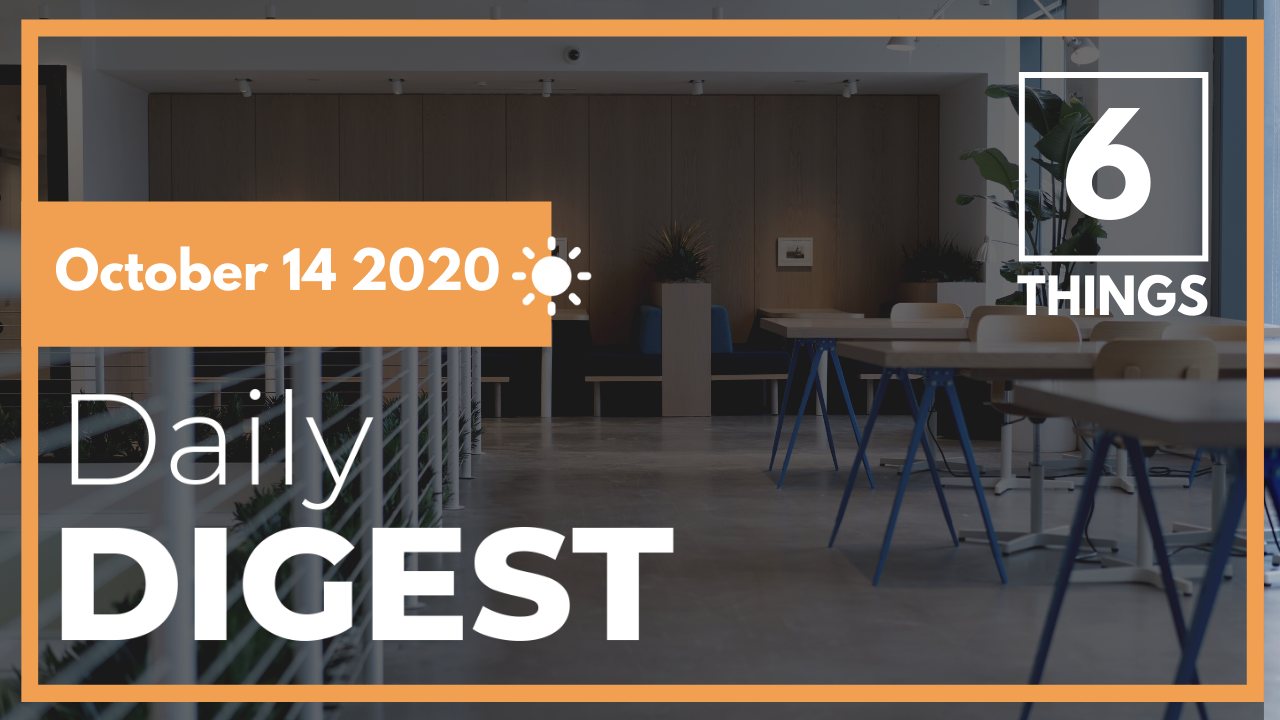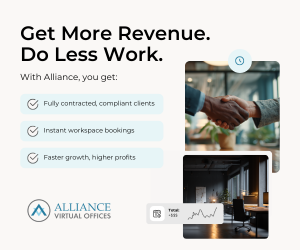Hand-selected flexible workspace news from the most reliable sources to keep you ahead of the pack. We find all the latest news, so you don’t have to. Morning and afternoon updates. Stay in the know.
Here’s what you need to know today:
- The Ultimate Solution Are Flexible Offices
- Dropbox Adopt Permanent Remote Work Policy
- Workers Express Concerns About Returning To The Office
- Seattle Brewery Adapts To Demand For Workspace
- Empowered Employees Are Emerging
- How HR Can Keep The Workforce Engaged
The Ultimate Solution Are Flexible Offices
The office space is constantly going through phases to adapt to society’s needs. As we enter the phase of flexibility, the industry is at a crossroads and must evolve in a way that accommodates new safety standards.
Flexible workspaces have become the unexpected solution for large companies looking to stay agile and asset-light during these times of economic uncertainty.
Younger generations, particularly Millennials, have been attracted to flexible workspaces since their growth in popularity nearly a decade ago. The use of these spaces not only helps organizations to stay nimble, but also offers professionals the freedom to choose where and when they work.
Flexible offices also help companies tap into new markets to expand their business, as well as their talent pool. This is particularly helpful in a time of remote working when professionals want to come back to the office, but would prefer a place closer to their homes.
One of the biggest reasons that a company may opt for flexible workspaces is simply for the cost-effectiveness. These offices typically involve signing cheaper, short-term leases and are already outfitted with the necessary amenities.
Dropbox Adopt Permanent Remote Work Policy
Dropbox has revealed that it will allow employees to work from home permanently, following similar announcements from Microsoft and Twitter.
The company also announced it would be converting its current offices into coworking spaces, dubbed “Dropbox Studios,” to accommodate employees who do want an office when it is safe.
The new flexible offices will be located in Austin, San Francisco and Seattle, as well as its Dublin location.
“While there may be some exceptions based on team and role, employees will also have flexibility to relocate outside of locations where we currently have offices. There will be some parameters but the choices will be much greater,” the company said. “As a result, we expect Dropbox to become more geographically distributed over time, and hope this offers our teams more choices in where they live, work, and hire from.”
In addition to allowing certain employees to work from home permanently, Dropbox said it will allow workers to create their own schedules aside from the company’s core collaboration hours.
Internal surveys from the company found that 90% of employees feel more productive when working from home and do not want to return to the office full-time.
Additionally, Dropbox has extended its mandatory remote working policy until June 2021.
Workers Express Concerns About Returning To The Office
According to a new study from workplace technology firm Envoy, 73% of US workers are concerned about the impact returning to the office will have on their health and safety.
Although the majority of respondents (94%) said they do want to return to the office, three-quarters of workers said they would consider quitting their job if they did not feel safe within the workspace.
The Protecting the Workplace study also found that 40% are worried about not knowing if someone comes into the office sick, as well as fear of too many people in the workplace.
However, employers must be careful with how far they pry into their employees’ personal health information. 37% of workers said they would consider switching jobs if their privacy felt intruded upon.
This shift is highlighting a privilege that white-collar workers have over blue-collar professions. For instance, 84% of business or tech serve professionals said they are more likely to leave their job than those in construction of manufacturing (71%).
Of those who have returned to the office, 42% said they saw measures not being enforced, including distancing, mask requirements and hand-washing practices.
“In order for companies to reopen safely and quickly, they’ll need to adopt technologies that create a more dynamic and responsive workplace that meets the needs of its workers, so that employees can return to the office confidently,” said Larry Gadea, founder and CEO of Envoy.
Seattle Brewery Adapts To Demand For Workspace
Seattle-based Optimism Brewing had done all it could to brace itself for a grim future after the pandemic hit the city.
Optimism once prided itself in hosting events, offering a vast array of IPAs, pilsners, as well as to-go growlers and cans. However, as closures dragged on, founder Gay Gilmore saw a new opportunity arise from the ashes.
“I would see guests come in, like right at noon, with their laptop in one hand and a backpack on their shoulder, and they’d be like, ‘Can I get a table near an outlet?’” said Gilmore. “I realized there’s this phenomenon that’s happening here. People are going nuts sitting in their apartments working. And they just want to get out for a little bit.”
This led Gilmore to open a Tock reservation link that allowed people to book a table in the brewery before normal business hours. Here, people could gain access to a quiet workspace outside of their homes and beer or water for around $15 to $20 a person.
With Washington Governor Jay Inslee recently lifting restaurant and bar restrictions, Optimism is seeing small work groups booking tables together.
However, Gilmore needed to make adjustments if she was going to move forward with this new type of coworking offering. She bought extension cords, upgraded the Wi-Fi, seating arrangements and is following COVID-19 protocols with large fans for ventilation, spaced seating and low-contact service.
Empowered Employees Are Emerging
A new survey from HP has found that workers who are feeling overwhelmed by current work arrangements are taking matters into their own hands, marking the rise of the “empowered employee.”
The survey of 1,000 office workers in France, Germany, Italy, Spain, the UK and US found that half have seen a reduction in work hours since the start of the pandemic. That has led empowered employees to use their newfound time to learn new skills, embrace flexibility and look to employers to provide the necessary resources to perform their best work.
However, less than a quarter of respondents said they received guidance from their employers on how to efficiently work from home.
Despite all of these challenges, the majority of workers said the pandemic could lead them to upgrading their work environment. Additionally, this time has also allowed employees to hone in on other skills such as foreign languages or tech support knowledge.
In fact, the survey found that one in six workers were learning at least one new skill during this time.
With job security falling and employees adopting new skills, many are looking for new career paths in the long-term. The study revealed that half of Millennials workers would consider starting their own business due to a loss of job security.
This means that companies will need to make an extra effort to retain their talent by supporting their needs, such as increased flexibility, better resources to support health and well-being and more.
How HR Can Keep The Workforce Engaged
Ginine Capozzi’s experience in HR and talent development led her to start KnowledgeForce Consulting LLC in 2012, which has helped organizations curate their training programs to boost engagement.
Capozzi describes the importance of HR professionals in regards to supporting behavioral health in the workplace, stating that they can help guide conversations that can nurture workplace culture and connection among employees.
In recent years, research has shown companies that prioritize a workplace culture grounded in wellness, particularly in psychological safety, outperform their competition in every meaningful measure,” said Capozzi. “HR contributes to setting that tone through hiring and management practices, benefits programs, leadership development, performance reviews, diversity and inclusion initiatives, and overall physical and emotional wellness.”
She adds that oftentimes, employers question exactly how to approach mental health problems or substance abuse issues in the workplace. This is particularly important as companies continue operating remotely, and business leaders are trying to improve their guidance skills to keep their workers engaged.
Improving upon leadership skills is necessary too, as research has proven that companies who invest in training, coaching and wellbeing resources for their workforce operate at a higher level.
This can range from offering fitness classes, increased flexible schedules or getting involved in civic-minded activities can help employees feel valued in their workplace, while improving their own physical and mental health.


 Dr. Gleb Tsipursky – The Office Whisperer
Dr. Gleb Tsipursky – The Office Whisperer Nirit Cohen – WorkFutures
Nirit Cohen – WorkFutures Angela Howard – Culture Expert
Angela Howard – Culture Expert Drew Jones – Design & Innovation
Drew Jones – Design & Innovation Jonathan Price – CRE & Flex Expert
Jonathan Price – CRE & Flex Expert














